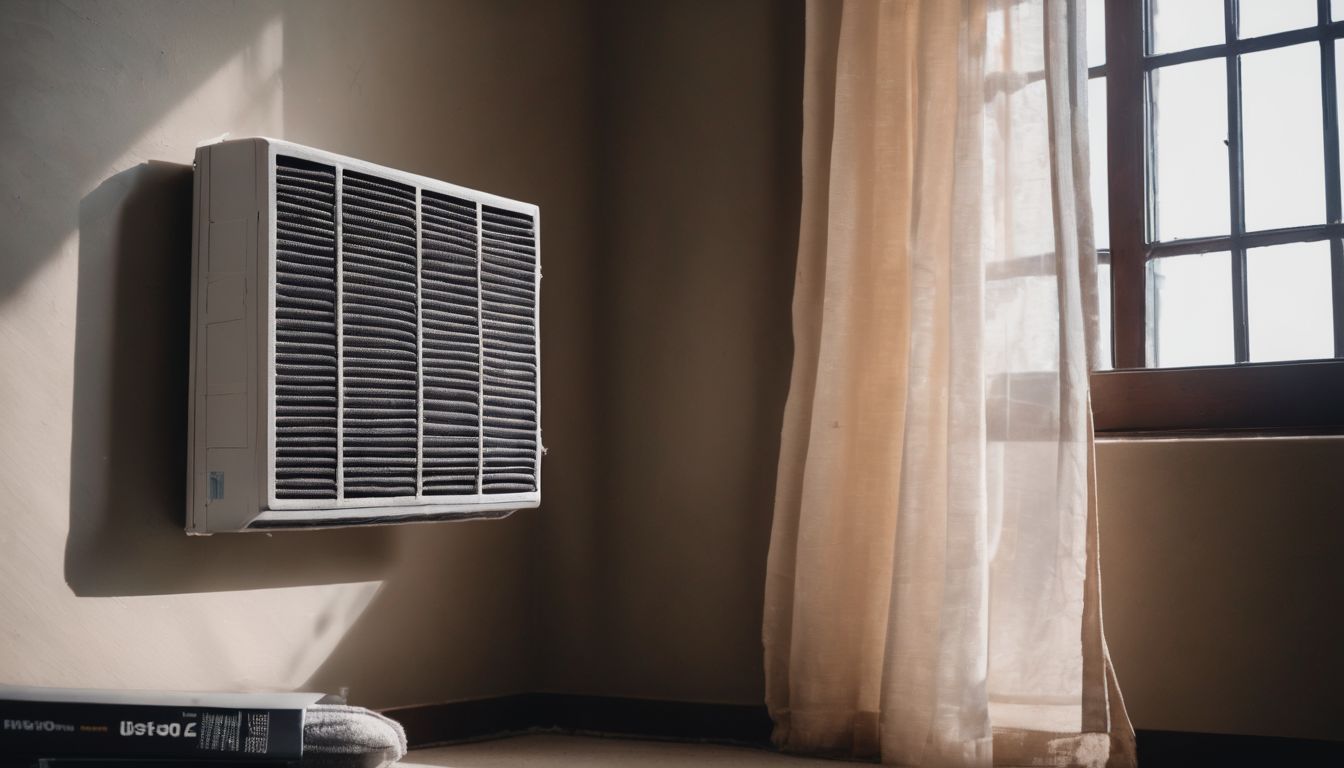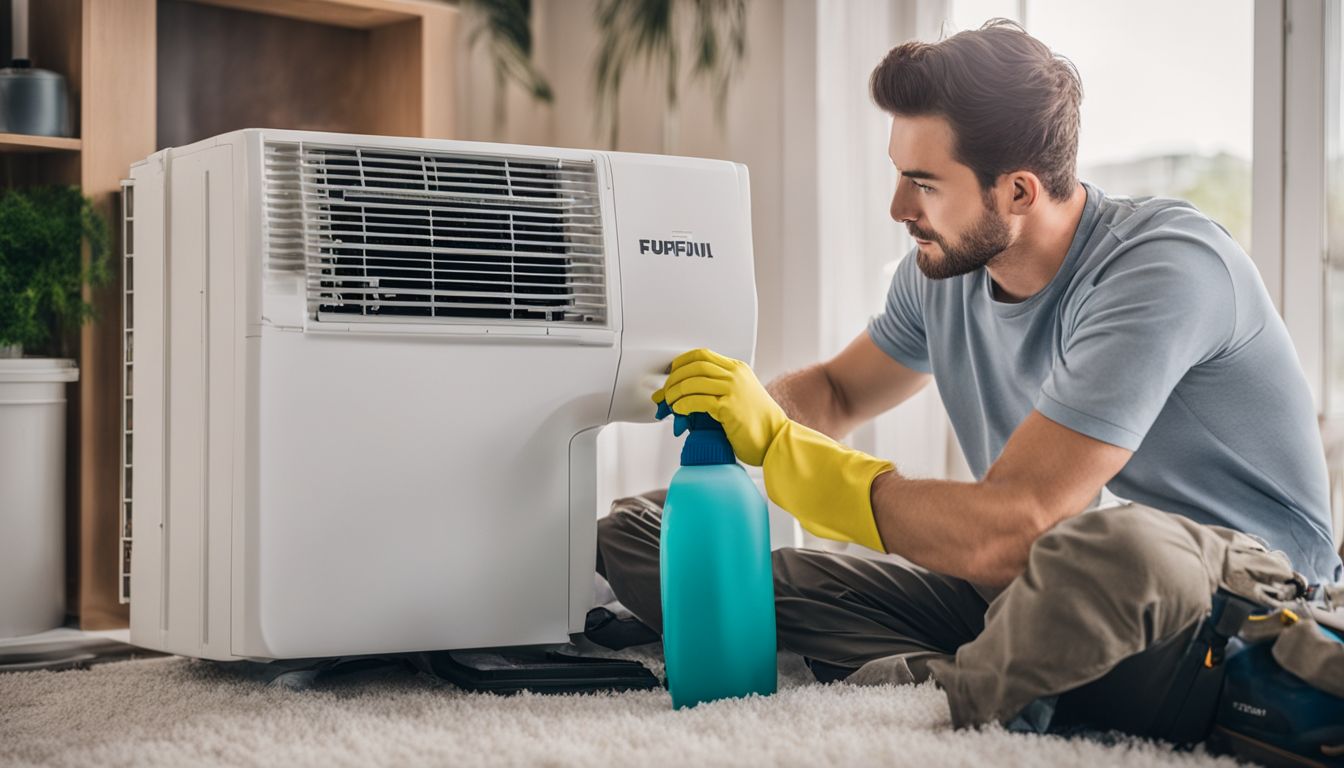Your aircon isn’t cooling as well as it used to, and your bills are creeping up. Clogged air filters can make your heating and cooling system work harder, using more energy. This post will explore the serious effects of a blocked filter and offer easy solutions.
Keep reading – you’re about to breathe easier.
Understanding the Role of Air Filters in Air Conditioning Systems
Air filters serve as the respiratory system of air conditioning units. They trap dust, pollen, pet dander, and other airborne particles to maintain clean air within indoor spaces. The filtration process not only preserves indoor air quality but also protects the interior components of the HVAC systems from damage caused by accumulating debris.
Optimally functioning filters enable efficient heat exchange between indoor and outdoor environments, thus maintaining steady temperature control throughout your living or working space.
Regular maintenance is crucial for air filter efficiency. Over time, accumulated particulate matter can block airflow through the ductwork, increasing energy consumption as blower fans must work harder to circulate air across clogged filters.
This strain on the system often results in higher utility bills and may even lead to furnace failure if left unchecked. Filters are rated based on their ability to capture contaminants—the Minimum Efficiency Reporting Value (MERV) indicates this capacity—and selecting the appropriate rating for your particular system ensures optimal performance and cleaner indoor environments.
Consequences of a Clogged Air Filter
A neglected air filter in your air conditioning system becomes the silent culprit behind a series of unwelcome effects, ranging from operational inefficiencies to health concerns.
Ignoring this vital component invites issues that compromise comfort and cost-effectiveness within your living or working space.
Increased Energy Consumption
A dirty air filter forces your air conditioner to work overtime. This extra effort leads to a spike in energy use, as the clogged filter restricts airflow and makes it tough for the system to circulate cool air efficiently.
Your heater or heat pump must compensate for this by running longer and working harder, which can cause a significant rise in your electricity bill.
Clean filters are essential for an efficient heating and cooling system. By simply replacing that grimy old filter with a fresh one, you could reduce the energy consumption of your aircon by 5% to 15%.
Not only does this mean cleaner air circulating through your home, but it also ensures that your HVAC unit doesn’t drain unnecessary power – saving you money while protecting the environment from excessive energy waste.
Reduced Cooling Capability
As air filters become clogged, the cool air flow is dramatically restricted. This means your central air conditioning works harder to circulate air but isn’t able to cool your space as effectively.
Imagine turning on your A/C on a hot day only with a lukewarm breeze that doesn’t lower the temperature.
Clogged filters force heating and cooling systems into overtime, causing strain on components like the evaporator coil. Without strong and consistent airflow through the system, frost can accumulate on the coils, further hampering efficiency and reducing cooling power.
The once seamless process of cooling your room becomes a struggle for your HVAC unit, biting into its reliability and leading to a hotter indoor environment.
Lowered Air Quality
Clogged air filters in your aircon are a direct ticket to poor indoor air quality. With the filter’s ability to trap dust and debris compromised, contaminants circulate freely through your home.
This situation affects overall comfort and can trigger allergies and respiratory issues among family members. Airborne contaminants such as pollen, pet dander, and microscopic pollutants can escalate when filters aren’t performing at their best.
Regular air filter replacement is crucial for maintaining clean indoor air. Neglecting this simple maintenance task means you risk allowing harmful particles to infiltrate the living space.
These particles inevitably lead to increased asthma episodes and reactive airways among sensitive individuals. A fully functioning filter plays a pivotal role by slashing indoor fine particle concentrations by 60%, safeguarding both health and well-being within the household.
Potential for Mold, Mildew, and Bacteria Growth
Air filters serve as the first line of defence against airborne contaminants. However, they create a perfect home for mould, mildew, and bacteria when they clog up. These unwelcome guests thrive in the trapped dust and debris, particularly if the air filter encounters moisture from leaks or high humidity.
The growth of these microorganisms can be rapid, turning your heating and air conditioning system into a distributor of poor indoor quality that may lead to health concerns.
Regularly replacing your air conditioner’s filter is crucial to prevent such microbial infestations. Dirty filters contribute to unsatisfactory cooling performance and become hotbeds for fungi and other pathogens identified in various studies as causes of illness.
Ensuring that clean filters are in place helps maintain the efficiency of your HVAC units while safeguarding you from potential respiratory infections and throat irritation associated with exposure to mold-infested environments inside your living spaces.
Uncovering the Causes and Remedies for Swift AC Filter Dirt Accumulation
AC filter dirt accumulation happens quickly and can affect your entire system. Understanding why this occurs and how you can prevent it is essential.
- Poor Air Quality: The air conditioner’s filters trap indoor air pollutants such as dust, pet dander, and pollen. To remedy this, use air purifiers and vacuums regularly in rooms to reduce the amount of debris circulating.
- High Usage: Constant operation means more particles are captured over time. Schedule regular breaks for your air conditioning unit to lessen the burden on the filter.
- Lack of Maintenance: Filters need cleaning or replacing at least once every three months. Set reminders for regular maintenance checks to avoid dirt buildup.
- Humidity Levels: Excess moisture makes filters damp and prone to clogging with particles. Use dehumidifiers in humid areas to keep moisture levels low.
- Closed Windows and Doors: Keeping windows shut can increase indoor air pollution. Open them occasionally to let fresh air flow through the home, easing the load on your AC’s filters.
- Fibrous Materials: Carpets and rugs release fibres, contributing to quicker filter clogging. Consider hardwood flooring or clean these items frequently to decrease fibre dispersal into the air.
- Ventilation Issues: Blocked or closed vents restrict airflow, causing filters to capture more particulates. Ensure all vents are open and unobstructed for optimal airflow.
- Substandard Filters: Cheaper filters may not be as effective at trapping dirt. Investing in higher-quality options requires less frequent changes and better protects against rapid dirt accumulation.
Conclusion
Keeping your aircon’s filter clean is crucial for optimal performance. Ignoring it spikes your energy bills and strains the system, risking serious damage. Effective maintenance includes regular checks and replacing the filter when necessary.
This ensures you stay cool during hot days and breathe cleaner indoor air, free from unwelcome allergens and pollutants. So, safeguard your comfort and health by giving your air conditioner the necessary care.
To better understand how to prevent your air filter from getting blocked swiftly and ensure your air conditioner’s longevity, read our detailed guide on the causes and remedies for rapid AC filter dirt accumulation.
FAQs
1. What happens if my aircon’s air filter is clogged?
A clogged air filter in your air conditioner can reduce airflow, causing the evaporator coils and heat exchanger to work harder than necessary.
2. Can a dirty air filter affect how well my heating & cooling system works?
Yes, a dirty air filter can strain your job heating & conditioning system by blocking proper airflow through the forced-air system, making it less efficient.
3. Should I clean or replace a blocked air filter in my home’s HVAC unit?
It’s best to replace a blocked air filter in your HVAC unit; vacuuming might not thoroughly clean it and could leave dust in the system, affecting customer service levels.
4. Do clogged filters only impact wall-mounted units or other systems too?
Clogged filters can impact any type of forced-air system, including window and central units, where the restricted flow affects both heat exchangers and reduces efficiency across all types of systems.
5. Why does an Aircon need clear filters to run smoothly like car engines?
Just as clean filters are crucial for maintaining airflow in car engines, they also ensure that conditioned air flows properly through your home when used with vacuum cleaner-like mechanisms within an AC’s internal components.





